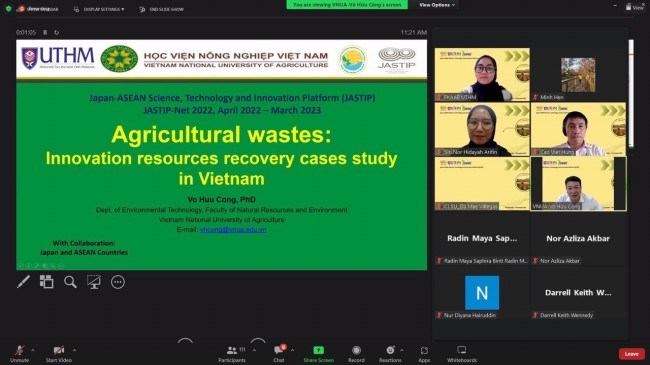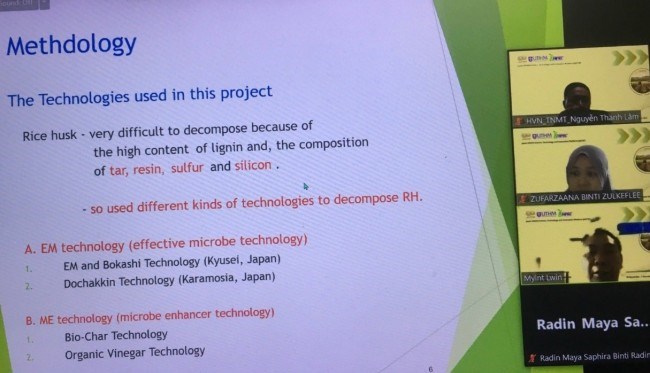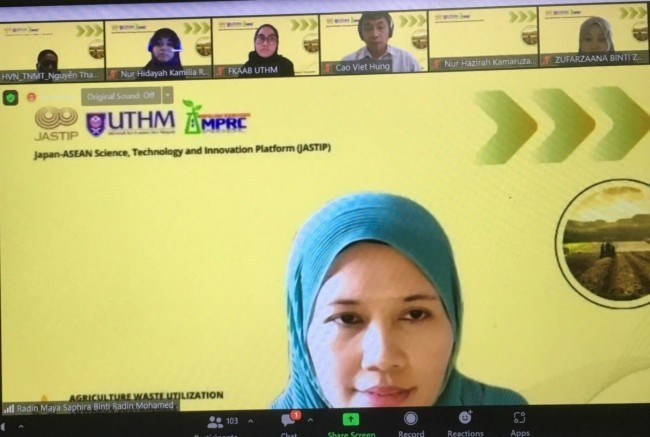International Symposium: Agriculture Waste Utilization Towards Sustainable Development in ASEAN Countries and Japan
Updated on 14:29, Monday, 05/12/2022 (GMT+7)
The international symposium “Agriculture Waste Utilization Towards Sustainable Development in ASEAN Countries and Japan” was organized via zoom online from November 29 to December 1, 2022. The objectives of the symposium were facilitating dialogues between scientists/researchers and policy-makers to embed scientific findings into the SDGs policy formulation in line with JASTIP research focus (energy and environment, bioresources and biodiversity, disaster risk reduction and prevention).
The international symposium “Agriculture Waste Utilization Towards Sustainable Development in ASEAN Countries and Japan” was organized via zoom online from November 29 to December 1, 2022. The objectives of the symposium were facilitating dialogues between scientists/researchers and policy-makers to embed scientific findings into the SDGs policy formulation in line with JASTIP research focus (energy and environment, bioresources and biodiversity, disaster risk reduction and prevention). The symposium was organized under framework of the project “Tapping the Values of Agricultural Waste for Resource Recovery and Empowering Circular Economy in Japan and ASEAN Countries for Sustainability” funded by Japan-ASEAN Science, Technology and Innovation Platform (JASTIP): Promotion of Sustainable Development Research.
There were 200 symposium’s participants, who were representatives for Japan and 6 Asian countries including Malaysia, Vietnam, Thailand, Philippines, Myanmar, and Indonesia. From Vietnam National University of Agriculture (VNUA), there were Assoc. Prof. Dr. Vo Huu Cong, Vice Dean of Faculty of Natural Resources and Environment (FONRE), and Assoc. Prof. Dr. Nguyen Thanh Lam, Department of Environmental Management. During the symposium meeting, Vietnam had shared the following 3 topics for discussion:
• Topic 1: Agricultural waste production and management in Vietnam, Dr. Cao Viet Hung, MARD
• Topic 2: Innovative resources recovery from agricultural wastes in Vietnam, Assoc. Prof. Dr. Vo Huu Cong, Faculty of Natural Resources and Environment, VNUA.
• Topic 3: Initiative on circular economy from agricultural waste resource recovery in Vietnam, Assoc.Prof. Nguyen Thanh Lam, Faculty of Natural Resources and Environment, VNUA.
The key finding of the symposium were: (i) Production using agricultural products as raw materials generates some quantities of agricultural solid wastes; (ii) About 280 million tons of waste in ASEAN from oil palm, sugarcane, coconut, rubber and rice industries with accompanying health risks and threat to ecosystems; (iii) Agricultural wastes produced in large tons and open fields or allowed to accumulate in some developing countries may be channeled toward biomass generation. Vietnam had 156 millions tons of by products in 2021 and it could bring about 4-5 billion USD if by-products were used efficiently (reuse and recycle). A number of practices were shared during the symposium meeting as follows: biochar and compost making, using EM or bio products to make agricultural waste into useful products. All participants agree that agricultural circular economy requires awareness, benefit sharing among participating actors, high technology, and human resources.
    |
 |
| Assoc. Prof. Vo Huu Cong presents at the 2022 JASTIP International Syposium |
    |
 |
| Assoc. Prof. Dr. Nguyen Thanh Lam presents at the 2022 JASTIP International Syposium |
    |
 |
| Assoc.Prof. Radin Maya Binti Radin Mohamed introduces the objectives of the 2022 JASTIP international syposium |
Noted by Nguyen Thanh Lam, FONRE